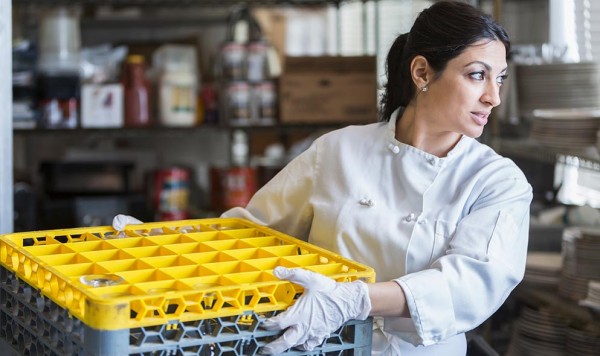latest
Restaurant industry wary of further possible minimum wage increase in Massachusetts

Alison Kuznitz
STATE HOUSE, BOSTON, MAY 24, 2023…..Restaurateurs and other small business owners are wary of a looming “threat” of a 2024 ballot question that could raise the state’s minimum wage beyond the $15 hourly rate that took effect in January.
Profitability for restaurants is down in the aftermath of the COVID-19 pandemic, with the biggest impacts stemming from inflation and labor costs, said Stephen Clark, president and CEO of the Massachusetts Restaurant Association.
Lifting the minimum wage by $1 per hour can translate into a $1,000 increase per employee, which sparks a cascading effect for all workers throughout the industry, Clark warned at a small business advocacy day Wednesday hosted by the National Federation of Independent Business, the Retailers Association of Massachusetts, and the Massachusetts Restaurant Association, among other partners.
“Truthfully speaking, I don’t think the minimum wage fight is something that’s going to happen this year. I think if we look at the legislative calendar, it’s probably more of a conversation for 2024,” said Clark, as he implored small business owners gathered at the University of Massachusetts Club to discuss the issue with lawmakers at the State House later Wednesday during their lobbying efforts.
The Raise Up Massachusetts coalition, a constellation of organized labor and community groups that played a key role in passage of the 2018 “grand bargain” law setting Massachusetts on the path to a $15 minimum wage, set its sights on another increase. The coalition is backing legislation that would gradually increase the minimum wage up to $20 by 2027 and nearly double the minimum wage for tipped workers to $12 an hour, and it filed paperwork in March exploring an initiative petition whose goal it described as “building shared prosperity in the Commonwealth through higher minimum wages and fair and adequate taxation.”
Backers of any initiative petition must file any proposed 2024 ballot question with the signatures of at least 10 registered voters by Aug. 2, the first hurdle in a multi-step process that involves multiple rounds of signature-gathering.
Ballot questions are “very expensive to defend,” Clark said.
Clark said restaurateurs also want the “fair and adequate taxation” referenced in the Raise Up Coalition’s ballot question paperwork, but he added that further raising the minimum wage — or what he dubbed the starting wage — could make it harder for businesses to hire teenagers poised to earn $20 per hour at their first job.
That challenge could subsequently limit the career ladder for young people and hinder their ability to develop “durable skills,” such as communication and sales, Clark said. He balked at the prospect of heftier wages for tipped workers, saying those individuals are “the highest-compensated earner in any restaurant.”
“They’re not looking to be saved — they don’t need a solution,” Clark said.
Steep health insurance costs are also battering small businesses, speakers said at Wednesday’s event. Retailers Association of Massachusetts President Jon Hurst said the average annual increase for members of his group — which represents 4,000 businesses — has been 11 percent since 2006, compared to about 4 percent for the Group Insurance Commission, the buying group for state and municipal employees.
“Small businesses, for a variety of primarily government playing field reasons, are paying a lot more for less coverage than those that employ at larger levels, whether they be big businesses or governments themselves,” Hurst said. “With each passing year, small businesses are becoming less and less competitive as an employment location.”
The merged marketplace for small businesses with up to 50 eligible employees is experiencing a “death spiral,” Hurst added. Some owners are opting for self-insured plans, Hurst said, representing a riskier decision as they seek better insurance coverage at a lower price.
Nearly 60 percent of Bay Staters support a minimum wage hike to reach $20, according to a Change Research survey conducted for Northwind Strategies earlier this year. Meanwhile, 33 percent of 711 likely voters queried were opposed to a bump and 7 percent were undecided.
Supporters argue that the sting of inflation in recent years has chipped away at the purchasing power that $15 per hour carries, particularly given the notoriously high cost of living in Massachusetts.
Rep. Paul McMurtry, House chair of the Joint Committee on Community Development and Small Businesses, called small businesses an “economic engine” that employs more than 1.5 million Bay Staters. Lawmakers can work alongside business association leaders and chambers of commerce to ensure a post-pandemic recovery that’s “positive” for every small business sector, the Dedham Democrat said.
“As we emerge from one of the most trying economic times in our history, it’s more important than ever to give small businesses every tool possible for them and you to be successful,” McMurtry said.
Lt. Gov. Kim Driscoll avoided wading into the minimum wage debate during her keynote address, though she touted the administration’s tax relief package, particularly changes to the estate tax and short-term capital gains tax that the administration says will boost the state’s competitive advantage. Unlike the House, the Senate has yet to unveil proposed tax breaks, though Senate Ways and Means Chairman Michael Rodrigues said a plan should come soon after fiscal 2024 budget deliberations this week.
“We’ll never be on a level playing field, to be honest, but we want to put ourselves in a position so that investments can continue to be made here, that we know the out-migration that might be happening can stop, and that we’re not such an outlier when it comes to opportunities to grow and thrive, both individuals as business leaders, and certainly from a corporate perspective, as well,” Driscoll said.
Driscoll appealed for partnership with the business community as the administration tackles workforce challenges and the housing crisis.
“We are committed to ensuring that we offer higher quality of life by increasing the amount of housing in our communities,” said Driscoll, who mentioned “good case studies” with denser zoning requirements in MBTA communities. “But frankly, we need your help — we need employers in this fight with us.”




HuntersCrackPipe
May 24, 2023 at 3:47 pm
This is being lead by Demonrat socialists!
Fed Up
May 24, 2023 at 4:33 pm
More nonsense. Everyone knew $15 an hour wouldn’t be enough and neither will $20 because that cost gets translated right back to the people it’s supposed to help.
HuntersCrackPipe
May 25, 2023 at 7:33 am
https://www.keywiki.org/Harris_Gruman